

Harvard Education Publishing Group - Home. Last year, when Sherryl Hauser, a third-year math teacher, had to plan a project to develop her teaching, it was an easy choice: differentiated instruction.
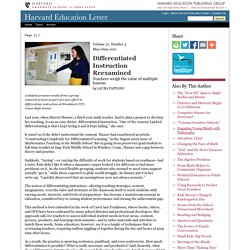
“One of the reasons I picked differentiating is that I kept trying it and it kept failing,” she says. It wasn’t as if she didn’t understand the concept. Hauser had coauthored an article, “Constructing Complexity for Differentiated Learning,” in the August 2009 issue of Mathematics Teaching in the Middle School. But in going from preservice grad student to full-time teacher at Sage Park Middle School in Windsor, Conn., Hauser saw a gap between theory and practice. Savage Science. How to Create Your Own Textbook — With or Without Apple. By Dolores Gende Apple’s iBooks2 and authoring app has created big waves in education circles.
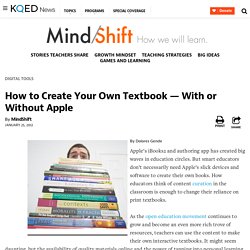
But smart educators don’t necessarily need Apple’s slick devices and software to create their own books. How ‘Deprogramming’ Kids From How to ‘Do School’ Could Improve Learning. iStock One day, Adam Holman decided he was fed up with trying to cram knowledge into the brains of the high school students he taught.
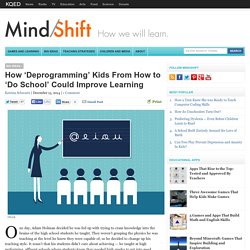
They weren’t grasping the physics he was teaching at the level he knew they were capable of, so he decided to change up his teaching style. It wasn’t that his students didn’t care about achieving — he taught at high performing, affluent schools where students knew they needed high grades to get into good colleges. They argued for every point to make sure their grades were as high as possible, but were they learning? “I felt I had to remove all the barriers I could on my end before I could ask my kids to meet me halfway,” Holman said. “The kids realized this made sense,” Holman said. “It turned my students into classmates and collaborators because I didn’t have a system in place to deny the collaboration,” Holman said. Holman didn’t just change his grading policies. The class read Timothy Slater’s article, “When Is a Good Day Teaching a Bad Thing?”
Inquiry Learning Vs. Standardized Content: Can They Coexist? By Thom Markham As Common Core State Standards are incorporated from school to school across the country, educators are discussing their value.
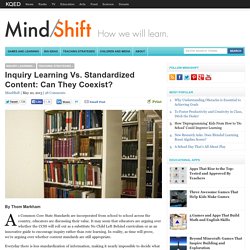
It may seem that educators are arguing over whether the CCSS will roll out as a substitute No Child Left Behind curriculum or as an innovative guide to encourage inquiry rather than rote learning. In reality, as time will prove, we’re arguing over whether content standards are still appropriate. Everyday there is less standardization of information, making it nearly impossible to decide what a tenth-grader should know.
Beyond the core literacies of reading, writing, computation, and research, the world-wide culture of innovation, discovery, multi-polarity, interdisciplinary thinking, and rapid change depends on the explosive potential of the human mind, not entombed truths from the past. There is only one resolution to the debate. So how can you, as a teacher, help move the dialogue forward? But PBL is the near-term solution. REDEFINE RIGOR. Why Inquiry Learning is Worth the Trouble. Visualization of SLA principal Chris Lehmann's 2011 talk: guiding kids' to thinking about how they think.
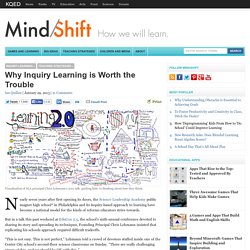
Nearly seven years after first opening its doors, the Science Leadership Academy public magnet high school* in Philadelphia and its inquiry-based approach to learning have become a national model for the kinds of reforms educators strive towards. But in a talk this past weekend at EduCon 2.5, the school’s sixth-annual conference devoted to sharing its story and spreading its techniques, Founding Principal Chris Lehmann insisted that replicating his schools approach required difficult tradeoffs.
“This is not easy. This is not perfect,” Lehmann told a crowd of devotees stuffed inside one of the Center City school’s second-floor science classrooms on Sunday. “There are really challenging pieces of this, and we should be OK with this.” “Inquiry means living in the soup. “To me it comes down to process,” Lehmann said. “Oh God, yeah,” Lehmann said in response to the latter teacher. Related. How ‘Deprogramming’ Kids From How to ‘Do School’ Could Improve Learning. Curiosity: It Helps Us Learn, But Why? : NPR Ed.
The Limbic Reward System lights up when curiosity is piqued.
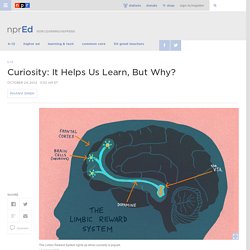
LA Johnson/NPR hide caption itoggle caption LA Johnson/NPR The Limbic Reward System lights up when curiosity is piqued. LA Johnson/NPR How does a sunset work? So Blackwell, who teaches science at Oliver Wendell Holmes Junior High in Davis, Calif., had her students watch a video of a sunset on YouTube as part of a physics lesson on motion. "I asked them: 'So what's moving? Binder basics {how to make a teacher planning binder}